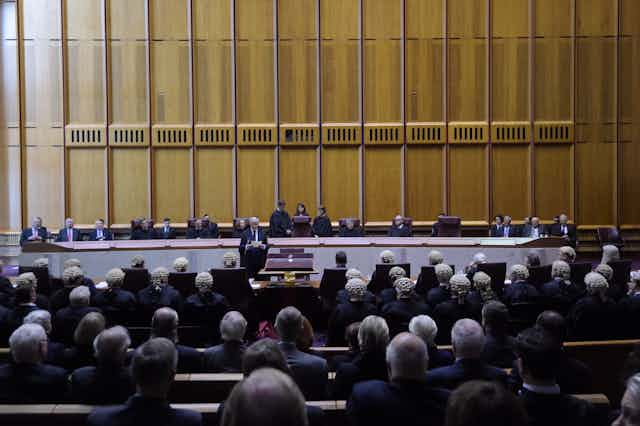The High Court unequivocally confirmed on Wednesday that political donations may be limited – both in their size, and even in who can make them. In doing so, the judges showed signs of a welcome embrace of the ideal of political equality to temper the court’s earlier fascination with political freedom.
The case, stemming from the ongoing Independent Commission Against Corruption (ICAC) investigations into the mire of party funding in NSW, was brought by Jeff McCloy, a former Newcastle mayor and now property developer. He and his companies objected to NSW laws, dating back two electoral cycles, that limit the amount anyone can donate to a NSW party to A$5000 per year or $2000 to a candidate. The laws also ban property developers (and alcohol and tobacco interests) from making political donations altogether.
By a unanimous seven to zero, the High Court judges accepted that limits on donations to parties and candidates are constitutional. McCloy had relied on a 23-year-old line of court authority that the Constitution protects a “freedom of political communication”.
By an almost-as-resounding six to one, the court accepted that it was legitimate to discriminate between property developers, and ordinary citizens or organisations, as political donors. It took explicit notice of a string of reports evidencing the real corruption risk between developers and state (or local) politics. It did not explicitly consider the bans on alcohol or tobacco donations, though these seem safe now.
The court, by six to one, also rejected the claim that donations – which are private political transactions – are acts of speech. Businesses and unions are free to run their own campaigns under their own names.
The court also gave almost contemptuous shrift to McCloy’s claim – honest or cynical – that donations are almost a necessary part of lobbying and getting one’s voice heard. On the contrary, the majority said that “guaranteeing the ability of the few to make large political donations to secure access to those in power [is] antithetical to the great underlying principle” of representative government and elections.
Equality and liberty: squabbling siblings or twins?
If the case were just another salvo in the battle to purge NSW of those influences afflicting governments of both stripes – which ICAC’s counsel has likened to “the Rum Corps” – it would be of note. But it would just be of relatively passing colour and interest.
To appreciate why this judgment may be a sleeper, we need to reflect on constitutional and electoral law – both judge-made and statutory – in recent decades.
On the constitutional front, in 1992 the High Court embarked on a controversial path of “implying” values that were not explicitly expressed into the fabric of the written Constitution. In a case brought by commercial TV companies, it struck down a law – based on British precedent – that banned paid election ads and instead offered free airtime to parties to put forward their policies.
In doing so, the court was rightly criticised for pulling a quasi-American idea of “free political communication” out of the aether. Subsequent courts have vacillated between restricting that approach, and applying it.
The approach was controversial in its method. Who is to say what is “necessarily” implied by constitutional institutions like elections or federalism? And why should the High Court, rather than an elected parliament, decide what is a reasonable balance between political freedom, integrity, equality and deliberation?
More importantly, the approach was problematic as it pushed one value – freedom of political communication – into pole position. Other values, especially equality, were not hoisted as constitutional norms, but were potentially trumped by the “freedom” value.
In McCloy’s case, however, the judges lined up to redress this imbalance. A joint judgment of four justices stresses that:
… equality of opportunity to participate in the exercise of political sovereignty … is guaranteed by the Constitution.
There is thus no constitutional freedom for money to speak (or scream). Rather, there is an “equality of opportunity” that seeks to harmonise concern for political freedom and equality.
The court also begins, at last, to better justify its claim to be entitled to restrict the discretion of the political branches to regulate politics. It does this by explicitly discussing the dangers of leaving the law of politics and elections purely to governments and parliaments.
This approach is a sounder basis than simply asserting an ultimate judicial right to interpret the Constitution as the bench wishes and to discover the values inherent in it. It narrows the potential for judicial activism in other areas of contested social or economic policy. It does so by appealing to notions of power, and pointing out that leaving the rules of democracy to politicians alone is to place a lot of trust in a single basket.
None of this is to say the judgment is a nirvana. Upholding a ban on one class of political donors (developers) requires strong justification, lest the law discriminate against other classes (unions versus corporations, for example).
But, overall, we don’t want courts meddling lightly by overturning well-considered or even experimental legislation. Constitutional judges are best seen as backstops, not as activists for one value like liberty over others like integrity and equality.

